Kicking Cancer
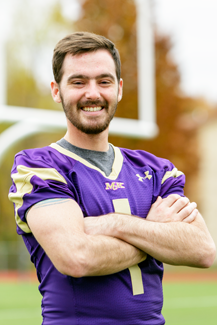 Like any athlete who makes it to the college level, there are so many hours put into
their sport, so much effort. Alex McMahon ’15 is no exception. In high school, his father Mike, a former high school football player,
encouraged his son to play football at Westville High School in Westville, Ill. With
the great kicking ability he developed from playing soccer for ten years, Alex naturally
became a punter and field goal kicker. He earned a scholarship to play football at McKendree. In 2010, he was on top of his game, coming off a stellar sophomore
season that saw his team reach the quarterfinals of the NAIA Championships. Alex averaged
43.4 yards on 22 punts, ranked third in the NAIA in punt return averages and was named
to the All-American second team.
Like any athlete who makes it to the college level, there are so many hours put into
their sport, so much effort. Alex McMahon ’15 is no exception. In high school, his father Mike, a former high school football player,
encouraged his son to play football at Westville High School in Westville, Ill. With
the great kicking ability he developed from playing soccer for ten years, Alex naturally
became a punter and field goal kicker. He earned a scholarship to play football at McKendree. In 2010, he was on top of his game, coming off a stellar sophomore
season that saw his team reach the quarterfinals of the NAIA Championships. Alex averaged
43.4 yards on 22 punts, ranked third in the NAIA in punt return averages and was named
to the All-American second team.
A few weeks after the season ended, things started to change for the 20-year-old athletic
training major. He started suffering from headaches and overall fatigue. “It just
started out like a cold or a sinus infection,’’ he recalled. He visited urgent care
on numerous occasions and was prescribed six different rounds of antibiotics for a
sinus infection. His sickness continued right through spring football, but Alex didn’t
let it slow him down. “I’m already a punter, and I didn’t want to be the guy that
wasn’t out there because of a cold or migraine headaches,’’ he said. He continued
to lift weights, dropping from an average 235 pounds to 185 pounds. In warm-ups, he
noticed his kicks did not have as much height or explosiveness. Things continued to
get worse for Alex as he had trouble sleeping, problems drinking water without coughing
and his weight dropped over 40 pounds.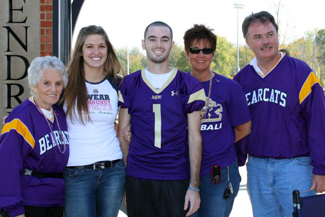 His mom Lori, a cardiac nurse, encouraged him to come home and get it checked out.
“It was just insane,’’ Alex said. “I was trying to get ready for finals and I just
couldn’t sleep. I was calling my parents every night it seemed like. Then with just
eight days left in my school year, they came and got me.” Alex went to the hospital
and got an MRI. “My mother came in and told me they found a tumor in my nasal pharynx,”
Alex said.
His mom Lori, a cardiac nurse, encouraged him to come home and get it checked out.
“It was just insane,’’ Alex said. “I was trying to get ready for finals and I just
couldn’t sleep. I was calling my parents every night it seemed like. Then with just
eight days left in my school year, they came and got me.” Alex went to the hospital
and got an MRI. “My mother came in and told me they found a tumor in my nasal pharynx,”
Alex said.
On May 2, 2011, Alex’s life changed. A doctor at Barnes-Jewish Hospital in St. Louis,
Mo., diagnosed him with Stage IV Nasopharanygeal Carcinoma, a rare form of cancer,
prevalent in Asian countries, that only seven in every 1 million people are expected
to develop. This type of cancer can stem from a combination of dietary and viral factors,
such as eating cured fish and the Epstein-Barr virus (mononucleosis).
Upon getting the diagnosis, Alex remained upbeat. “I was RELIEVED,” he noted. “Most
people do not think that. I was happy because I finally got an answer. For four months
I had been told I had sinus inflammation and finally I knew we were on a treatment
plan and something would get better. I hoped.”
Alex was used to studying playbooks, but there isn’t a playbook for dealing with a
situation like cancer. He began his weekly journey of receiving chemotherapy and radiation
treatments close to home at the Cancer Center at United Samaritans Medical Center
in Danville, Ill. After two-and-a-half months, and over 75 treatments, Alex’s PET
scan came back clear in August.
Alex never fell into that dark place some can’t climb out of. He took on the treatments,
with all their side effects, and he planned out the small steps he would take to reach
his ultimate goals. “I never broke down,” said Alex. “I felt that I had to be strong
for my parents and my friends because they broke down. I couldn’t imagine hearing
that your kid who is 20 years old has cancer. You have to put on a good face as much
as sometimes you don’t want to. But I felt that it helped the situation to have a
positive attitude.”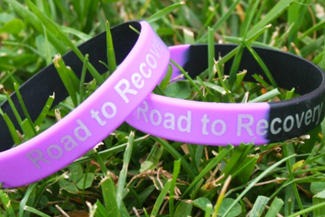 While Alex was undergoing his treatments, the ongoing support from his family, friends,
McKendree faculty, athletic training classmates, teammates and coaches kept him motivated
and looking toward the future. His family and friends started “Alex’s Army” to raise
money toward his medical expenses. They held a benefit raffle, golf outing and sold
t-shirts. Dr. Dawn Hankins, professor of athletic training, kept in regular contact with Alex and sent him a signed picture of the whole athletic
training family. His classmates sent him cookies and banana bread. Coaches contacted
him weekly. When he would come down to visit, the team let him break the huddles before
games. They gave him a signed football and let him keep his #1 jersey until he was
ready to come back. The team also hosted Alex McMahon Day and sold purple and black
“Road to Recovery” bracelets.
While Alex was undergoing his treatments, the ongoing support from his family, friends,
McKendree faculty, athletic training classmates, teammates and coaches kept him motivated
and looking toward the future. His family and friends started “Alex’s Army” to raise
money toward his medical expenses. They held a benefit raffle, golf outing and sold
t-shirts. Dr. Dawn Hankins, professor of athletic training, kept in regular contact with Alex and sent him a signed picture of the whole athletic
training family. His classmates sent him cookies and banana bread. Coaches contacted
him weekly. When he would come down to visit, the team let him break the huddles before
games. They gave him a signed football and let him keep his #1 jersey until he was
ready to come back. The team also hosted Alex McMahon Day and sold purple and black
“Road to Recovery” bracelets.
With his cancer in remission, Alex turned his attention to getting his life back to
normal and finishing his coursework. He attempted to return to school in the fall
of 2011, however shortly after classes began he started getting pain in the shoulder
and hip. On Oct. 3, 2011, his doctor at Barnes confirmed the old tumor showed no growth,
but there was a large lesion in the back of the skull, a lymph node in the left side
of the neck, a lymph node in the left armpit, and the neck of the femur was affected
with cancer. His cancer had spread.
“My mom cried,” he recalled. “My dad asked all the questions. Would I ever get to
play football again? The doctor answered, No! When could I go back to school? The
doctor answered, Never! She gave me nine months to live. That was when the realization
of how serious things were hit me. I was ANGRY. Not angry at having cancer, but at
the doctor. She didn’t know me. She was telling me what my life was going to be. I
was not going to be a statistic.”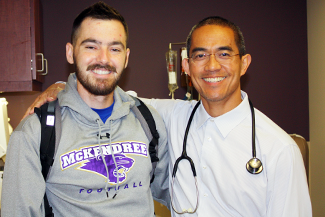 Alex decided to switch doctors and with the help of his local oncologist, Dr. Jomel
Labayog, they were able to put together a team of doctors from around the world. They
consulted with an ENT from Loyola Hospital in Chicago, an oncologist from MD Anderson
Cancer Center in Orlando, Fla. and an oncologist from Hong Kong, who specializes in
Alex’s type of cancer. The doctors came up with a new game plan, a combination of
four chemotherapy treatments and radiation. “Each week I would get three chemos and
then on the fourth week I would get an additional chemo treatment,” said Alex. “I
called it BAD CHEMO. The fourth one was when I felt the sickest and would lose all
my appetite. I was now down to 130 pounds. It was hard on my body. It just wasn’t
fun.”
Alex decided to switch doctors and with the help of his local oncologist, Dr. Jomel
Labayog, they were able to put together a team of doctors from around the world. They
consulted with an ENT from Loyola Hospital in Chicago, an oncologist from MD Anderson
Cancer Center in Orlando, Fla. and an oncologist from Hong Kong, who specializes in
Alex’s type of cancer. The doctors came up with a new game plan, a combination of
four chemotherapy treatments and radiation. “Each week I would get three chemos and
then on the fourth week I would get an additional chemo treatment,” said Alex. “I
called it BAD CHEMO. The fourth one was when I felt the sickest and would lose all
my appetite. I was now down to 130 pounds. It was hard on my body. It just wasn’t
fun.”
In February 2012, another lesion was found on Alex’s right shoulder. After a trip
to MD Anderson Cancer Center in Orlando, Fla., his game plan was once again altered
and he started his current chemotherapy treatment plan. Traditionally used to treat
breast and colon cancers, Alex is now taking a monthly combination of Cisplatin and
Fluorouracil “5FU.”
“With the new treatment plan underway, I was finally able to regain weight and started
to feel normal again,” he said. “I ate everything. I had no real mind for nutrition
at that point. I craved Reese’s Cups. I started playing summer softball with friends.
And in the fall I started training for football again. I realized that my kicks were
still good and that I still had a chance as a punter.”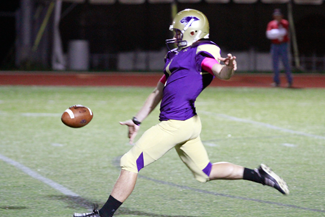 Alex overcame his October 2011 diagnosis and was able to return to McKendree in January
2013. Still unsure of his college football career, he emailed Coach Mike Babcock and was invited to attend the team meeting in January and all the spring workouts.
“I kept up with everyone during the workouts and that was when I realized that I could
play again at the college level,” he said. After multiple rounds of chemotherapy,
radiation and more than two years of healing and rehabilitation, Alex earned his spot
back on the team and finally stepped back onto the football field on Sept. 7, 2013.
“I was super nervous,” he said. “I had butterflies until the first snap, but after
the first snap it all went away.” He had an outstanding game with a 62-yard career
punt and was named the special teams’ player of the game. He took that momentum and
played the remainder of the season, finishing with a 37.6 yard punt average.
Alex overcame his October 2011 diagnosis and was able to return to McKendree in January
2013. Still unsure of his college football career, he emailed Coach Mike Babcock and was invited to attend the team meeting in January and all the spring workouts.
“I kept up with everyone during the workouts and that was when I realized that I could
play again at the college level,” he said. After multiple rounds of chemotherapy,
radiation and more than two years of healing and rehabilitation, Alex earned his spot
back on the team and finally stepped back onto the football field on Sept. 7, 2013.
“I was super nervous,” he said. “I had butterflies until the first snap, but after
the first snap it all went away.” He had an outstanding game with a 62-yard career
punt and was named the special teams’ player of the game. He took that momentum and
played the remainder of the season, finishing with a 37.6 yard punt average.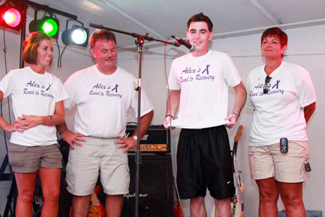 Since returning to McKendree, his life has been filled with a lot of ups and downs.
It has been difficult at times to balance monthly chemotherapy with keeping up with
classes and performing on the football field. It has also been hard to acclimate back
into his social life. “When I returned to school, I had a hard time communicating,”
he said. “I was/am still introverted a little bit. I was alone honestly for six-seven-eight
months there after the first diagnosis.” The support from his family, teammates, coaches,
and friends certainly have made things a lot easier; but, his trek has been a huge
grind, both mentally and physically. “I want to show people who have a life long illness,
it doesn’t matter what you have, as long as you have a good support system and you
want to do it, you can always put your mind to it and achieve the goals you want,”
he said.
Since returning to McKendree, his life has been filled with a lot of ups and downs.
It has been difficult at times to balance monthly chemotherapy with keeping up with
classes and performing on the football field. It has also been hard to acclimate back
into his social life. “When I returned to school, I had a hard time communicating,”
he said. “I was/am still introverted a little bit. I was alone honestly for six-seven-eight
months there after the first diagnosis.” The support from his family, teammates, coaches,
and friends certainly have made things a lot easier; but, his trek has been a huge
grind, both mentally and physically. “I want to show people who have a life long illness,
it doesn’t matter what you have, as long as you have a good support system and you
want to do it, you can always put your mind to it and achieve the goals you want,”
he said.
He has not let his illness stop him from reaching for his dreams. Alex is on track
to graduate in December 2015. Upon graduation, he plans to attend graduate school
for athletic training or get a job as a personal trainer or strength and conditioning
coach. “I want to help athletes get back to the field and enhance their performance
to the best of their ability,” he said.
When reflecting on his journey, Alex quotes Robert Frost using three words to sum
up everything he has learned about life: “It goes on.”

